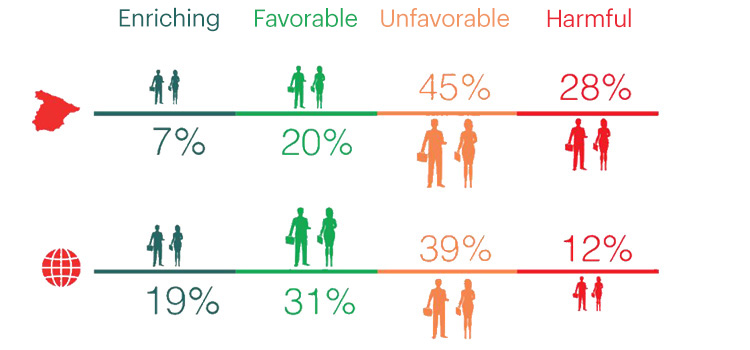7 In 10 Spaniards Believe Their Company Makes It Hard To Reconcile Work And Family – Analysis
By IESE Insight
Some 73 percent of the employees surveyed in Spain feel that their workplace makes it difficult to reconcile work and personal lives — at times or systematically. What’s more, workers fear that using the flexible-work options that are available could hold back their careers within the organization.
These data points suggest conciliation is undervalued and insufficient in Spanish businesses today, with social policies that are inflexible and lacking sufficient support from management. So says the 2018 IESE Family Responsibility Employer Index (IFREI) report, led by professor Mireia Las Heras from IESE’s International Center for Work and Family.
The study analyses three fundamental aspects of corporate family responsibility in Spain today:
- formal policies,
- managerial support and
- corporate culture.
Given that providing employees with the means (policies) to integrate their work and personal life is crucial, it’s also vital to make sure these measures can be applied effectively, something which requires a receptive attitude among business leaders (support) and an environment (culture) that fosters conciliation.
Inadequate Formal Policies
According to the study, for Spanish companies, the most common flexibility measures — in terms of both time and space — are flexible schedules (6 in 10 employees have access to this) and part-time work (available to 66 percent of women and 52 percent of men). Teleworking is still not available to most people (41 percent of men and 39 percent of women), although it is more widely available than some other measures — such as a compressed work week or job-sharing.
Other family-support measures are also scarce — namely, subsidies for taking care of children or other dependents; daycare services at the worksite; and the option to lengthen maternity/paternity leave beyond the limits set by law. In fact, the only widely-implemented family-support measure is the ability to leave work in the case of a family emergency: around 90 percent of those interviewed say they are granted this.
The study also finds that Spanish companies provide insufficient information about the services that are offered to help balance work and personal/family life. These services include: professional and personal guidance; information on daycare/schools or day centers/homes for the elderly; and informative sessions, seminars or workshops on workplace and family conciliation. Spain lags behind global average in all of these categories.
Lack of Managerial Support
The IFREI analysis focuses on the role that managers play in four areas of conciliation:
- emotional support,
- instrumental support,
- their capacity to set an example when it comes to corporate family responsibility (CFR), and
- how well they manage work-life balance policies.
The results obtained are compelling, although with different nuances depending on whether the manager is male or female.
In the case of male managers, their employees (whether male or female) perceive a low level of emotional and instrumental support. Male managers are not seen as setting an example and their management of CFR policies does not meet with their employees’ approval. The opposite occurs for female managers, with one exception: women with female managers also report a low level of emotional support.
Impact of Corporate Culture
It is not just line managers who have a decisive influence over their employees’ capacity to reconcile their work and personal lives: Colleagues’ attitudes and the corporate culture also influence how well CFR policies are implemented.
The results of the IFREI study back these conclusions: 7 in 10 interviewees in Spain feel that using the CFR policies available to them could hinder their professional development (a much higher percentage than in the other countries analyzed). More than 40 percent believe that using unpaid leave to care for their children may be frowned upon by their colleagues, and a significant portion of those interviewed (41 percent of men and 48 percent of women) feel that their organization pressures them into working beyond their contractual obligations or expects them to put work before family.
What Kind of Workplace?
Based on the analysis of the three aspects of CFR, the IFREI classifies workplace environments into four categories depending on the extent to which they support their employees’ work-life balance: enriching, favorable, unfavorable or harmful.
The results warn of a high level of dissatisfaction among Spanish workers: 28 percent state that they work in a directly “harmful” environment which systematically gets in the way of conciliation. Meanwhile, 45 percent describe their workplace environment as “unfavorable.” In total, some 73 percent of interviewees in Spain are dissatisfied, a figure way above the 51 percent found globally with the same survey.

A mere 7 percent of Spanish workers see their workplace environment as one which systematically promotes conciliation, compared with 19 percent elsewhere in the world.
Financial, Personal and Social Costs
The study concludes with a warning re: the costs arising from a lack of real commitment to conciliation. Unfavorable or harmful workplace environments not only lead to unhappy employees who are more prone to family conflicts caused by their work, they also lead to employees who are less committed and much more likely to leave the company. That hurts efficiency and leads to higher administration and recruitment costs.
The opposite is true of businesses with a culture of conciliation. In fact, such companies are perceived as fairer and more committed to equal opportunities between men and women.
Methodology, Very Briefly
In Spain, the study analyzes responses from 964 individuals (68 percent men and 32 percent women) with different family circumstances and various levels of professional responsibility. The results are also compared with those from global surveys which have been under way since 2010.

